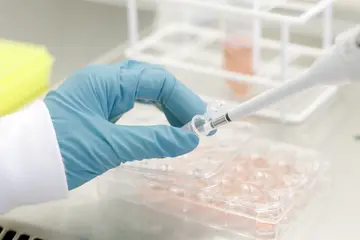April 22, 2021 – Novozymes, the world leader in biological solutions, has called on Earth Day for elected leaders to continue to raise ambition levels, encourage research, and promote earth-friendly investments. In a new column, published by The Capital Times in Wisconsin, United States, Brian Brazeau, President of Novozymes North America, outlines how smart policy and smart science will allow biofuel and agricultural centers to play a transformational role in advancing climate leadership.
Those contributions, Brazeau notes, can help “raise the bar for nations around the world" under the Biden Administration’s renewed commitments to international efforts at this week’s Earth Day Climate Summit.
“As the world’s largest industrial biotechnology company, with bioinnovation operations from Copenhagen to Milwaukee, Novozymes is proud to support that effort. Starting right here in the Midwest, we can harness the renewable potential on millions of acres of cropland to sequester greenhouse gas (GHG) emissions, boost yields, and increase the production of renewable energy made from farm crops like corn or soybeans,” writes Brazeau.
The full column at The Capital Times has been inserted below.
Earth Day: Together, we can build a better future
Thanks to innovations in biology, we have a window of opportunity right now to make transformational progress.

Homegrown innovation offers climate road map
By Brian Brazeau, guest columnist
United Nations leaders recently issued a "red alert" about the landmark Paris Agreement, noting that commitments offered by participating nations fall far short of what is needed to halt catastrophic climate change. The news raises pressure on world leaders, including President Joe Biden, who formally rejoined the pact this February.
U.S. leaders say they hope to submit a U.S. climate plan — or nationally determined contribution (NDC) — to world leaders in time for an Earth Day summit. Of course, that task is easier said than done. Fortunately, thanks to innovations in biology, we have a window of opportunity right now to make transformational progress, especially in agricultural centers like Wisconsin.
As the world’s largest industrial biotechnology company, with bio-innovation operations from Copenhagen to Milwaukee, Novozymes is proud to support that effort. Starting right here in the Midwest, we can harness the renewable potential on millions of acres of cropland to sequester greenhouse gas emissions, boost yields and increase the production of renewable energy made from farm crops like corn or soybeans. With smart policy and smart science, the Biden administration can raise the bar for nations around the world, but to do that, it is vital the administration ensure that biofuels hold a central place in the U.S. NDC.
According to a recent report from the International Energy Agency, bio-based fuels are expected to contribute more to reducing global emissions in the decades ahead than any other technology — including battery power. Equally important, those near-term contributions will be vital to halting a 1.5-degree Celsius jump in global temperatures. Failure, according to the scientific community, would unleash the most devastating effects of climate change.
Thankfully, according to the IEA, we have enough sustainable biomass to replace up to 30% of transportation fuel — if nations are committed to making it happen.
The key is unlocking that energy and empowering farmers and biofuel producers to deploy the latest technologies. At Novozymes, we specialize in tapping into the power of nature to deliver advanced biology that does everything from boosting crop yields without added fertilizer to improving laundry detergents to cut energy and water waste. In Wisconsin and across the nation, our enzymes help biofuel producers get more energy out of every harvest. These technologies have already helped the U.S. replace about 10% of liquid fuels with renewable alternatives.
Today, that revolution stands to accelerate dramatically as more and more farmers adopt sustainable techniques that improve soil health, turning our cropland into a carbon sink. According to the IEA, biofuels are not only cleaner than fossil fuels, their carbon footprint continues to shrink over time and “can also be net negative” when made from waste or combined with carbon-trapping innovations.
Ambitious plans released by the House and Senate climate committees already emphasize the vital importance of these bio-based solutions to address the climate crisis. In the months ahead, the new Congress must turn those ideas into action — creating the incentives that will allow the entire agricultural supply chain to invest in the future. At the same time, President Biden must follow through on his campaign commitments to open the fuel market to higher-biofuels blends, like E15, that allow drivers to save money while reducing consumption of fossil fuel.
These opportunities will not only drive green economic growth here in the Midwest, they offer a road map for our neighbors around the world. From field to tank, the customers we work with here in Wisconsin are already showing how we can make that goal a reality. But we cannot do this alone. That is why it is so important for all elected leaders to continue to raise ambition levels, encourage research and promote earth-friendly investments. Together, we can build a better future.
Brian Brazeau is president of Novozymes North America and vice president of Agricultural & Industrial Biolsolutions, Americas.
Facts
- The 2018 IPCC Report found that the risks associated with a warming world are substantially lower at 1.5 degrees than at 2 degrees. The IPCC also found that to stay within striking distance of limiting temperature increases to 1.5 degrees, the world must halve global emissions by 2030 and achieve net-zero emissions by 2050.
- Thanks to innovations in biology, there is a window of opportunity right now to make transformational progress by decarbonizing the transportation sector using clean, affordable biofuels.
- Novozymes’ technologies help biofuel producers get more energy out of every harvest. This can be used to harness the renewable potential on millions of acres of cropland, sequester GHG emissions, boost yields, and increase the production of low-carbon biofuels made from farm crops, such as corn or soybeans.
- According to a recent report from the International Energy Agency (IEA), bio-based fuels are expected to contribute more to reducing global emissions in the decades ahead than any other technology.
- Other research from the Rhodium Group shows that low-carbon biofuels will play a key role in achieving net zero in the U.S. by 2050.
- Scientists from Harvard, Tufts, MIT, and Environmental Health & Engineering Inc. recently found that corn ethanol reduces life cycle greenhouse gas emissions by 46% compared to gasoline.
- Biofuels are 46-120% less carbon intensive than petroleum, including land use, and have delivered almost 80 percent of all carbon reductions under the California Low Carbon Fuel Standard (LCFS) to date.
Get in touch
Media relations



